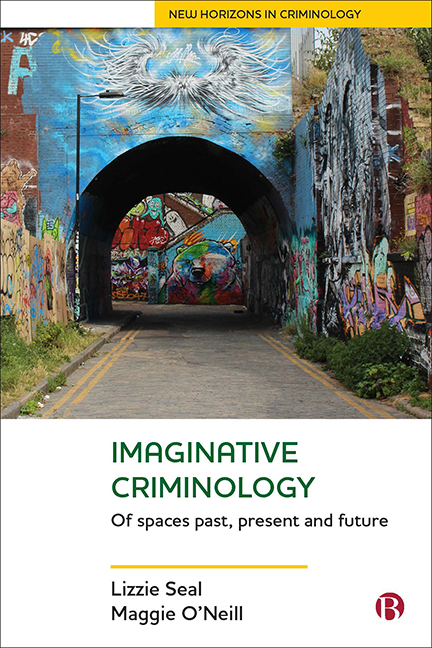Book contents
- Frontmatter
- Contents
- List of figures and tables
- Preface
- 1 Imaginative Criminologies of Space: the Spaces of Imaginative Criminology
- 2 Historical Spaces of Confinement 1: Homes for Indigenous Children in Australia
- 3 Historical Spaces of Confinement 2: Magdalene Laundries
- 4 Creative Writing and the Imagined Spaces of Imprisonment
- 5 Border Spaces and Places: the Age of the Camps
- 6 Imagining Spaces of Violence and Transgression in Vancouver and Northern Ireland
- 7 Imagining Dystopian Futures in Young Adult Fiction
- 8 Conclusion
- References
- Index
3 - Historical Spaces of Confinement 2: Magdalene Laundries
Published online by Cambridge University Press: 30 April 2022
- Frontmatter
- Contents
- List of figures and tables
- Preface
- 1 Imaginative Criminologies of Space: the Spaces of Imaginative Criminology
- 2 Historical Spaces of Confinement 1: Homes for Indigenous Children in Australia
- 3 Historical Spaces of Confinement 2: Magdalene Laundries
- 4 Creative Writing and the Imagined Spaces of Imprisonment
- 5 Border Spaces and Places: the Age of the Camps
- 6 Imagining Spaces of Violence and Transgression in Vancouver and Northern Ireland
- 7 Imagining Dystopian Futures in Young Adult Fiction
- 8 Conclusion
- References
- Index
Summary
This is the second chapter on imagining historical spaces of confinement. We adopt the same approach as the previous one in drawing on cultural representations and oral history interviews as feeling forms, in this case to examine the imagination of Magdalene laundries in post-independence Ireland. As with residential schools in Australia, we explore the significance of memory and cultural memory to this imagination. We continue to employ Goffman’s ([1961] 2007) concept of the total institution, mindful of its influence on cultural representations and as a way to make sense of the subjective experience of institutionalisation. As confining institutions that were specifically for women and girls, Magdalene laundries regulated and punished gendered transgressions of normative femininity, in particular the transgression of imagined Irish womanhood. Through physical separation from mainstream society, and the cultural and institutional imposition of shame, women and girls in laundries were rendered socially abject.
Magdalene laundries as confining institutions
Magdalene laundries in post-independence Ireland were sites of ‘coercive confinement’ for young women perceived and judged to be immoral (O’Sullivan and O’Donnell, 2012). Established in the 18th and 19th centuries as institutions of rescue and reform for women who worked as prostitutes, they became a constituent part of the deepening religion-based disciplinary regime of the post-1922 Irish state. They became more punitive once they were run by Catholic religious orders (McCormick, 2005; Crowley and Kitchin, 2008). The laundries were spaces of confinement for girls and young women who had become pregnant outside of marriage and/or had given birth to illegitimate babies – or who were considered to ‘pose the risk of [sexual] temptation’ (Pine, 2011: 36). A small percentage of women and girls were committed to laundries following a conviction for infanticide, or were placed there as a condition of probation or following release from prison (see Black, 2018), ‘but the majority were placed by families as a result of sexual transgressions’ (O’Sullivan and O’Donnell, 2007: 37–8). There were also admissions from industrial schools, reformatories and mother and baby homes. Confinement as ‘inmates’ or ‘penitents’ in these institutions was indefinite as there was no specified sentence or mandated release (Smith, 2007; Fischer, 2016). There was also little or no state regulation. Around a thousand women were held in 10 Magdalene laundries by the 1950s and the last such institution did not close until 1996 (O’Sullivan and O’Donnell, 2007).
- Type
- Chapter
- Information
- Imaginative CriminologyOf Spaces Past, Present and Future, pp. 37 - 54Publisher: Bristol University PressPrint publication year: 2019



